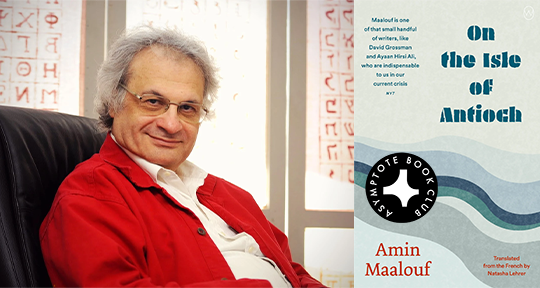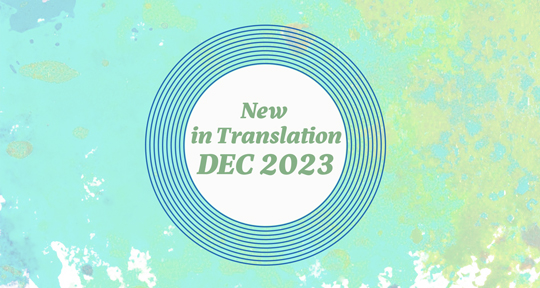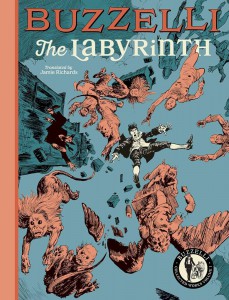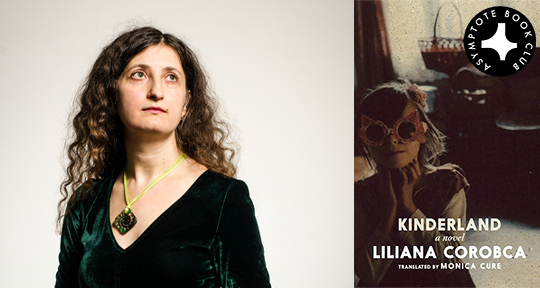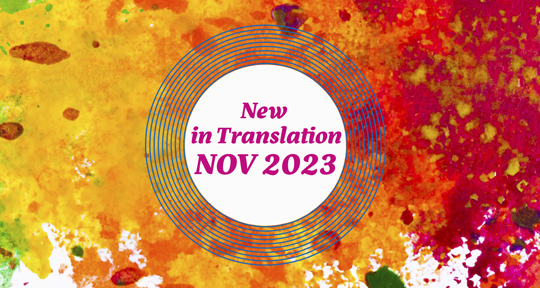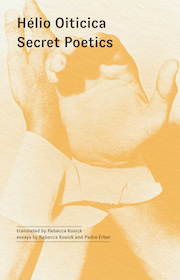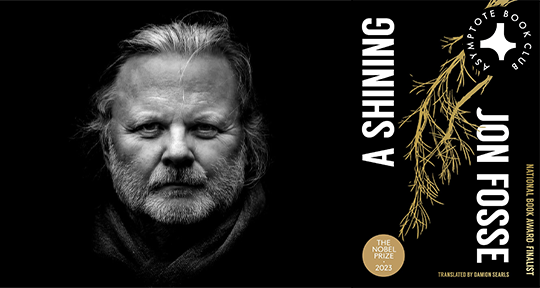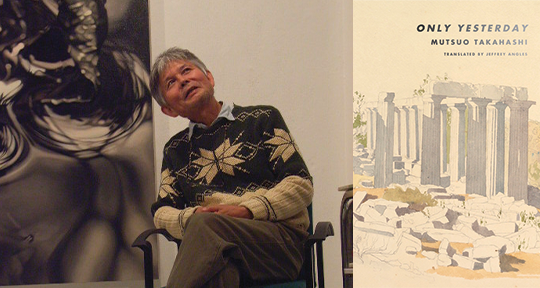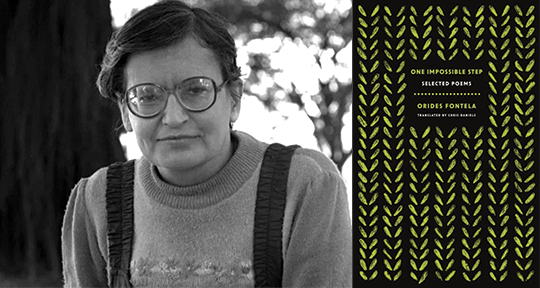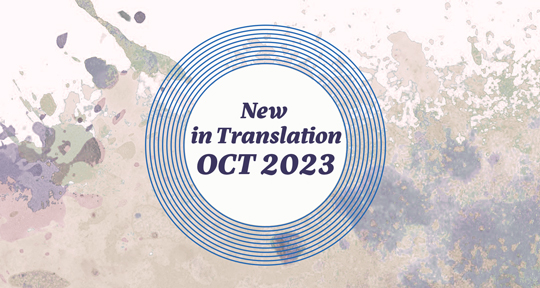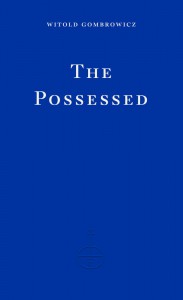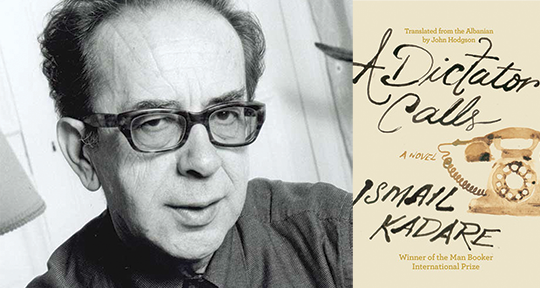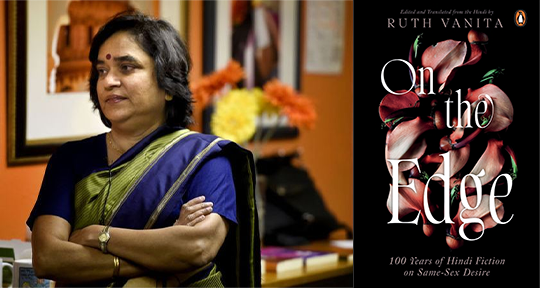One Impossible Step by Orides Fontela, translated from the Portuguese by Chris Daniels, Nightboat Books, 2023
In 1624, the English poet John Donne wrote that “no man is an island,” a line intended to succinctly describe the relational existence of individuals in the world. In One Impossible Step, a new collection of the work of the Brazilian poet Orides Fontela, the focus is not upon the relationship between individuals in the world, but rather in the connection between man and his island. The collection, translated from the Portuguese by Chris Daniels, compiles works from across Fontela’s entire corpus and is buttressed by a section titled “Poetics,” which explores her literary style through a thoughtful translator’s note, interviews with the poet, and several critical essays—all of which serve to form a clear understanding of the poet’s fascination with the natural, physical Others that compromise our world, ranging from a bird, to a rose, to a star. In the very first poem of this work, “Speech,” the reader is told that “all will be aggressively real,” but that the consequence of this realness will be our wounding.
From this fascination with the natural emerges Fontela’s idea of the poem as “an idea expressed in a very concrete image . . . something closed, a strong defined image.” The question then arises: why does this image wound us? Perhaps because it exists only through language, the collection suggests. Any mode of expression divides the poet from the world, and if language is the tool that allows for communication, it is also the obstacle between the elements of the world and the poet. The sequencing of the poems in this collection is worth noting here. Daniels, in his translator’s note, describes the translation as following the original texts by beginning with sound and ending with silence, almost as if each section is an exploration into the futility of language as it meets the elements of the natural world. Indeed, in the fittingly titled “Poem,” Fontela writes about the subject thusly:
To know silence by heart
—and profane it, dissolve it
in words
She takes this a step further in the poem “Rose,” describing writing as akin to murder:
I murdered the word
And hold my living hands in blood.
For Fontela, the act of writing is an act of profanity against life itself, reducing it to the image alone. That profane act of reinforcing the impossible distance between the world and the writer is further complicated, then, by the act of reading, and particularly the act of reading in translation. The poet is necessarily separated—always an “impossible step” away from the bird, the star, the rose—and language concretizes this “distance of looking”; the reader is never able to see what the poet sees, while the reader of the translation will never even see it in the same language. The natural world is understood through perspectives all at a degree of separation from each other, and the bridge of translation, here, is a reconfirmation of the distance between one side and the other. But what is left behind is a longing that can never be fulfilled. “[T]he real,, Fontela writes, “will ache in us forever.”
That is, to the poet, man is an island and yet distinct from the island itself. The paradox lies in being part of the world—being able to observe the flight of a bird, the twinkling of a star—and knowing that one is wholly separate from it:
The star completes
the unity it does
not inhabit.
The state of isolation is also one that leads to unrecognition:
the stars do not interconnect
and the greatest distance
is merely looking.
This “distance” that “is merely looking” is a gaze that only serves to highlight the lack of recognition, even when the other is a sister star or brother strangers. To Fontela, the star may be forgiven; she has no mirror and therefore necessarily lacks empathy and knowledge of her shared form. However, when Fontela turns her attention to humanity, her poetry becomes far more barbed:
It is the stranger (the brother) who knocks
But there will never be
a reply:
welcome’s country
is far to go.
The stranger has a face one can recognize—perhaps even a tongue one can understand as well, if only one chooses to stay in “welcome’s country.” But the fact that the Other may share your face and your tongue does not reduce the isolation of one’s existence. Nor can it reduce the inherent narcissism of perspective. Unlike the star, we may look in the mirror—having the capacity to recognize the commonality between ourselves and others—but in the mirror, only “I” exists only “I” stares back.
A god
I eye
eye
to
eye . . .
. . . We see by mirror
And riddle
. . . but would there be another
way to see? . . .
the mirror devours
the face.
At one point in this collection, Fontela compares language to a stone, dense and infinite in possibility. That infinity, however, can only exist within silence, or within the wholeness of the stone. To borrow heavily from the philosophy of John Searle, the tool of chiselling is perspective. Individual consciousness is necessary to move from the dense silence of the totality of language into speech. The stone, when it is simply the raw material for a sculptor, has the possibility to become anything. It is the artist’s perspective which creates the sculpture and the poem, but it is the very act of chiselling, or rather the tool of perspective, that the isolation of the impossible step is reaffirmed:
To construct abstract towers
yet the struggle is real.
The poet can never understand the flight of the bird nor its settling, despite an endless observation of the Other. In constructing the poem, the image is created, an image that profanes the real; the actual language of flight is one that we, as readers of this English-language collection, must encounter through translation, through the perspective of the translator. Language, here, is an isolating act of love.
The translator’s situation itself is indicative of this “deep, profound love,” as Fontela puts it. Daniels must face the difficulty of translating poetry that is, at its core, concerned with both languages beyond those of the human and with the grammar of silence. How do you approach these images knowing they are marked with isolation, that such a mark must be made visible to another audience? How do you translate a work that is so focused on the silence of the world?
In One Impossible Step, the approach is to explore, chronologically, a few select subjects in Fontela’s oeuvre before moving to a study of her poetics. The resulting benefit is that the reader is provided an opportunity to consider Fontela’s evolution as a poet, as she plays with form and plumbs for deeper insight into the world. In this collection alone, the bird is mentioned eighteen times; yet, for all those eighteen poems, the reader understands that the poet is unable to move closer to the subject itself. Every poem takes her away from the hermetic language of flight, and the bird will never know of her desire for it.
For though the “impossible step” is the central preoccupation of this collection, none of the poems themselves use this term; it is an implicit understanding, constructed through the conspicuous absence of the poetic figure of an “I.” The ache of perspective cannot be avoided, but the struggle to get beyond oneself, to reduce the step to the world, is ever present. The focus may be on the image and the ethical struggle involved in its crafting, but it is ultimately a struggle made all the more powerful for its backgrounding of the poet. Daniels captures this effect when he writes, in his translator’s note, that:
. . . she wished to express ideas, to write about the world, the universe, and perception itself, while taking herself out of the picture, however impossible that may be.
One Impossible Step is a lonely work. Yet, paradoxically, its loneliness is that of any living being; we are able to understand it and empathize with it, while never getting away from the fact of our own seclusion. “Lucidity / maddens.” We will never be able to sing with the bird, nor with the poet—the privilege is to be told the story of the birdsong through the voice of the poet and her translator.
Meenakshi Ajit is currently a MA student at the University of Chicago. She is interested in comparative literature and theatre studies, particularly the drama of the ancient world.
*****
Read more on the Asymptote blog:

